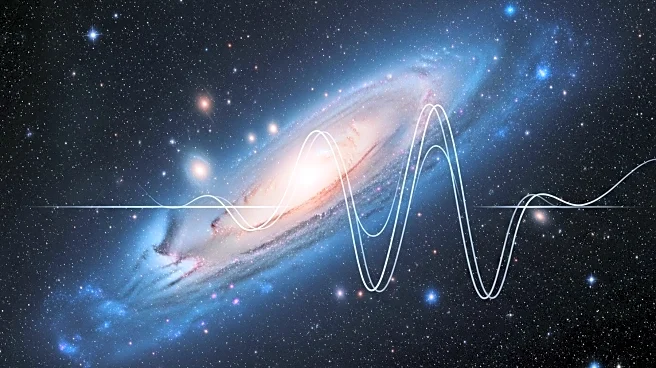What's Happening?
NPR's science podcast, Short Wave, marks the tenth anniversary of the groundbreaking detection of gravitational waves, a significant advancement in astronomy. This discovery has allowed scientists to 'listen' to the universe, providing insights into cosmic events that occurred billions of light years away. The podcast episode, hosted by Regina Barber and featuring NPR science correspondent Nell Greenfieldboyce, explores the origins and implications of these waves. Gravitational waves are ripples in spacetime caused by massive cosmic events, such as the collision of black holes or neutron stars. This method of observation complements traditional optical astronomy, offering a new dimension to understanding the universe. The episode is part of NPR's ongoing efforts to engage the public with complex scientific topics through accessible media.
Why It's Important?
The detection of gravitational waves represents a paradigm shift in astrophysics, offering a novel way to study the universe. This advancement has significant implications for our understanding of fundamental physics, including the nature of gravity and the behavior of extreme cosmic phenomena. By providing a new observational tool, gravitational wave astronomy enhances our ability to test theories of general relativity and explore the origins of the universe. The broader impact extends to educational and public engagement, as such discoveries inspire interest in science and technology fields. The continued exploration of gravitational waves could lead to unforeseen technological innovations and deepen our comprehension of the cosmos.
What's Next?
As gravitational wave detection technology advances, scientists anticipate more frequent and detailed observations of cosmic events. Future developments may include the construction of more sensitive detectors and international collaborations to enhance data collection. These efforts aim to refine our understanding of the universe's most violent and energetic processes. Additionally, the integration of gravitational wave data with other astronomical observations could lead to new discoveries about the formation and evolution of galaxies, stars, and black holes. The scientific community is poised to explore these opportunities, potentially leading to groundbreaking insights in the coming years.
Beyond the Headlines
The ethical and cultural implications of gravitational wave research are profound, as they challenge our perception of the universe and our place within it. This field of study raises questions about the nature of reality and the limits of human knowledge. Furthermore, the international collaboration required for such research fosters global scientific cooperation, promoting peace and understanding across borders. As we continue to explore the universe through gravitational waves, we may also encounter philosophical questions about the origins and fate of the cosmos, prompting deeper reflection on humanity's role in the vast expanse of space.












